Are vegan or vegetarian pregnancies safe? What does a vegan meal plan for pregnancy look like? Join me as I share my personal journey along with science-backed insights on how you can maintain a healthy vegan or vegetarian pregnancy.
This content is for informational purposes only and not intended as medical advice. Please see our disclaimer page for more information.
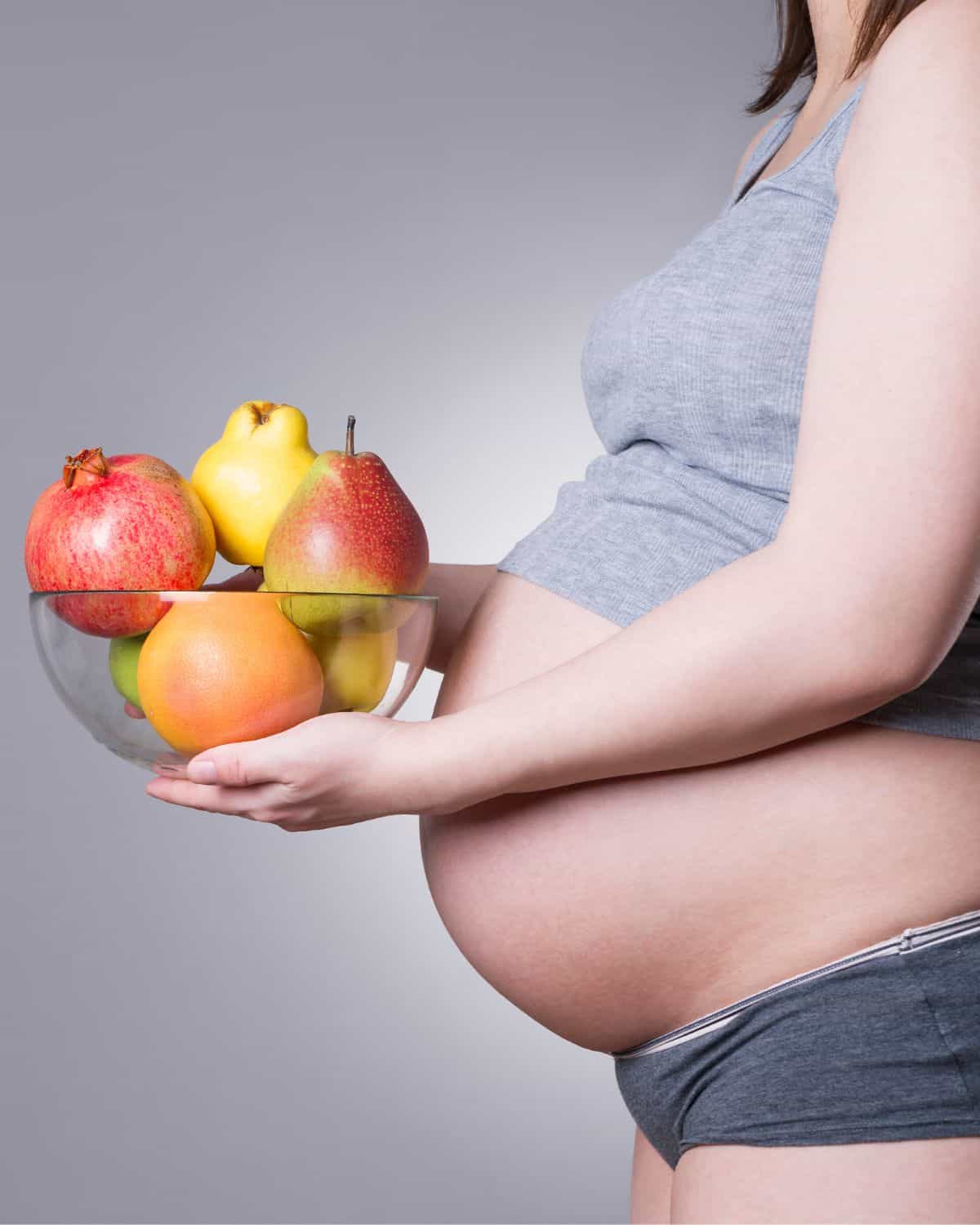
Jump to:
- My Vegan Pregnancy Experience
- What are Vegan & Vegetarian Diets?
- Are Vegetarian or Vegan Diets Safe During Pregnancy?
- Nutrients: Pregnancy Needs
- Nutrients: Breastfeeding Needs
- Nutrients: Potential Risks
- Recommended Supplements:
- Vegan Diet and Fetal Brain Development
- Overcoming Nutritional Challenges on a Vegan Diet
- How to Transition to a Vegan Meal Plan for Pregnancy
- 💭Tips: Transitioning to a Vegan Diet
- 💭Tips: Vegan Meal Planning and Preparation
- 7-Day Vegan Pregnancy Meal Plan:
- FAQ: Vegan Meal Plan for Pregnancy
- My Plant-Based Journey: A Closing Note
- More Vegan Pregnancy Recipes:
- Information Source
My Vegan Pregnancy Experience
What does a vegan pregnancy meal plan look like? Is a vegan pregnancy safe? By far the most common question I received when I fell pregnant with my third (and first vegan) baby. Concerns, comments, and general interest, I received them all. In an effort to normalize vegan pregnancies, and to add yet another healthy vegan pregnancy story, I want to share with you both my journey as a vegan mama and the research I came across with baby number 3!
My third pregnancy was actually my first vegan pregnancy. To this day when I look at my son, I am still blown away that I made this human entirely out of plants. Growing up in a meat-centric Brazilian household I was raised to believe that animal products are essential to a healthy life and development. For a long time, I let that thought, and the lack of awareness regarding what a vegan pregnancy meal plan looks like influence my thoughts! But when I look at my son I see how wrong I was, and I see a healthy, happy, chubby little man.
Seeing my healthy son thrive, and educating myself on the connection between food and health, has completely changed my perspective. That's why wrote this post! To share with you my story, and my vegan meal plan for pregnancy. To reassure you that a healthy vegan pregnancy isn't just a fantasy. It's a reality you can achieve with the right supplementation and support! A bountiful, healthy vegan pregnancy isn't just possible—it's a joyous journey I can't wait to share with you.


What are Vegan & Vegetarian Diets?
Before we dive in, it's important to understand what we mean when we talk about 'vegetarian' and 'vegan' diets. A vegetarian diet includes grains, pulses, nuts, seeds, vegetables, fruits, eggs, and dairy, but says no to meat.
A vegan diet goes a bit further. It's entirely plant-based, with no animal-derived products at all - that means no eggs, no dairy products, and not even honey.
Now that we've got our definitions straight, let's tackle the big question: is it safe to have a vegan pregnancy?"
Are Vegetarian or Vegan Diets Safe During Pregnancy?
Is it safe to follow a vegetarian or vegan pregnancy meal plan? This question has popped up in conversations, online forums, and even in the doctor's office. Based on my experience, and reinforced by science, the answer is a resounding yes!
While vegan and vegetarian pregnancies often raise eyebrows, a well-planned vegan and vegetarian pregnancy diet plan is not only safe but also brings numerous health benefits (1,2). Various scientific studies show that a plant-based diet can offer protection against obesity, hypertension, hyperthyroidism, type-2 diabetes, and cardiovascular diseases (2).
But, like any diet during pregnancy, there are nutrient considerations to be mindful of. Protein, fiber, omega-3 fatty acids, iron, zinc, iodine, calcium, vitamin D, and vitamin B12 - all play starring roles in supporting a healthy pregnancy (1,3). With a little planning and knowledge, you can get all these nutrients from a plant-based diet.
During my pregnancy, I made sure to include a variety of nutrient-rich plant-based foods in my diet. Working closely with my doctor, I had regular bloodwork done to keep an eye on key nutrient levels and make adjustments to ensure my baby was getting everything needed for healthy development.
Supplementation can also play a crucial role in a vegan pregnancy. Certain nutrients, like vitamin B12 and iodine, usually need a boost from supplements (4). It's all about balance and ensuring that you're meeting your increased nutritional needs during pregnancy.
To sum up, a vegan pregnancy meal plan is absolutely safe, as long as it's well-planned and monitored (1,5). Remember, each pregnancy is unique, and what works for one person may not work for another. It's important to work closely with your healthcare provider to create a vegetarian pregnancy diet plan that's right for you.
Nutrients: Pregnancy Needs

When it comes to dietary choices during pregnancy, the key is to maintain balance and ensure that all nutrient needs are met. Nutrition should be considered holistically; it's not just about meeting the demands of pregnancy, but also about building a healthy environment for baby to develop and grow and establish a healthy relationship with food.
Here is a brief overview of the key nutrients needed in your vegan meal plan for pregnancy. And their plant-based sources:
- Calories: Your calorie needs increase during pregnancy. Make sure to eat various nutrient-dense foods to meet these needs without overeating.
- Vitamin C: Known for boosting immunity, it’s abundant in fruits like oranges, strawberries, and guavas.
- Calcium: For strong bones and teeth, good sources of calcium are fortified plant milk, tofu, and leafy greens like kale.
- Iron: The need for iron increases during pregnancy to support your expanding blood volume. Lentils, chickpeas, and fortified cereals were my go-to sources.
- B Vitamins: These are crucial for many functions, including brain development. Whole grains, legumes, seeds, and nuts are all rich in B Vitamins.
- Zinc: Found in beans, nuts, and whole grains, zinc is essential for cell growth and the production of DNA.
- Magnesium: Critical for building bones and teeth. Foods like spinach, pumpkin seeds, and black beans are high in magnesium.
- Folate: Crucial for the development of the neural tube. Lentils, leafy greens, and fortified foods were a staple.
- Omega 3 and Omega 6: Important for brain development. Chia seeds, flax seeds, and walnuts are all great sources.
- Protein: A vital building block for your baby's growth. Lentils, tofu, quinoa, and chickpeas are packed with protein.
As for quantities and further details, check out the table below, and head over to NIH's nutrient recommendation database or the American Pregnancy Association.
Table 1: Nutrient recommendation during pregnancy and breastfeeding
| Nutrient | Requirement During Pregnancy | Requirement During Breastfeeding | Source |
|---|---|---|---|
| Calories | +340 to +452 Kcal/day | +330 to +400 Kcal/day | Vegetables, fruits, grains, legumes, nuts and seeds |
| Vitamin C | 85 mg/day | 120 mg/day | Citrus fruits, strawberries, bell peppers, broccoli |
| Calcium | 1000-1300 mg/day | 1000-1300 mg/day | Tofu, fortified plant milk, kale, bok choy |
| Vitamin D | 15 µg/day | 15 µg/day | Fortified foods (plant milks, orange juice) |
| Iron | 27 mg/day | 9 mg/day | Lentils, chickpeas, beans, spinach, tofu |
| B12 | 2.2 µg/day | 2.4 µg/day | Fortified foods, B12 supplement, nutritional yeast |
| Zinc | 11 mg/day | 12 mg/day | Whole grains, legumes, nuts and seeds |
| Magnesium | 350-400 mg/day | 310-320 mg/day | Almonds, spinach, black beans |
| Folate | 520 µg/day | 450 µg/day | Dark leafy greens, beans, peas, lentils |
| Omega 3 & 6 | 1.4 g/day & 13 g/day | 1.3 g/day & 13 g/day | Flaxseeds, walnuts, hemp seeds, algae oil supplement |
| Protein | 71 g/day | 71 g/day | Quinoa, lentils, chickpeas, tofu, tempeh |
During my pregnancy, I paid extra attention to ensure that my diet was rich in these nutrients. Regular bloodwork helped keep track of my nutrient levels and if there was a need for supplementation. It's also essential to consult with a healthcare provider before starting any new supplement or diet regimen.
While this sounds like a lot to consider, creating a balanced vegan meal plan for pregnancy helped me ensure I was getting all the nutrients my baby and I needed, and it will do the same for you! Remember, it's important to work with your healthcare provider or a dietitian to tailor a diet to your individual needs.
Nutrients: Breastfeeding Needs

Whether you choose, or are able to breastfeed or not, nourishing your body with a nutrient-dense diet is essential after birth. After my son was born, I maintained a nutrient-dense vegan diet to support my postpartum body and breastfeeding needs.
Staying hydrated and consuming enough calories is vital not only for postpartum but also for your well-being. It's important to note that every woman's post-partum and breastfeeding journey is unique, and personal circumstances may vary. Please remember that whatever decision you make regarding breastfeeding, your well-being is most vital!
In my case, as I embarked on the journey of breastfeeding I focused on plant-based protein sources like lentils and tofu and included foods rich in omega-3 fatty acids such as chia seeds, hemp, and walnuts. A variety of fruits, vegetables, whole grains, and legumes provided essential vitamins and minerals. For specific reference values and example food sources, take a look at the table above.
It's important to consult with a healthcare professional or a registered dietitian for personalized guidance. By nourishing myself with a well-rounded vegan diet, I could provide my son with the nourishment he needed while supporting my own well-being. In the end, my son was born at a healthy weight, and perfectly healthy!
Nutrients: Potential Risks
Creating a vegetarian or vegan pregnancy meal plan can present unique challenges if you are not mindful of your nutrition. While many women have healthy pregnancies and deliver healthy babies, it's essential to understand the potential risks to ensure that your baby gets the nutrition they need.
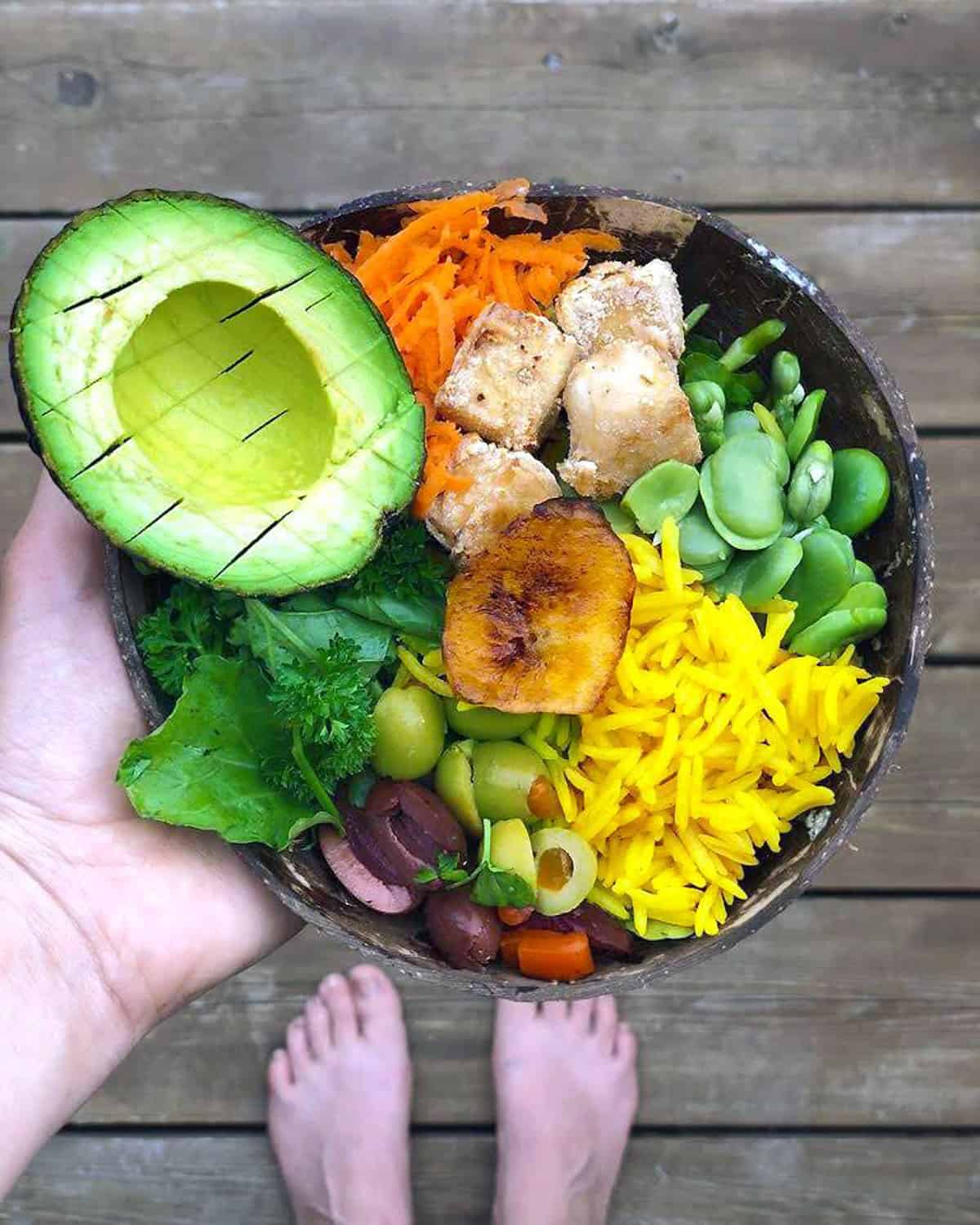
Micronutrients to monitor:
Firstly, there are certain nutrients you'll want to keep an extra close eye on (the table above has the exact values):
- Vitamin B12: This vitamin is super important for your health and your baby, but it's mainly found in animal-derived foods. If your levels are low, it can lead to issues like anemia in you and neurological issues in your baby (7). No worries though, a supplement like Ritual Essential Prenatal can help you meet your needs.
- 2. Iron: Iron is a must-have mineral, especially during pregnancy as you're making extra blood. If you're not getting enough, it can lead to anemia and preterm birth (8). Luckily, there are vegan-friendly supplements like Future Kind Vegan Prenatal Vitamin that can help.
- 3. Iodine: Iodine is key for your baby's brain and nervous system development, and it's sometimes overlooked in vegetarian and vegan diets. Not getting enough can affect your baby's cognitive development (9). But no stress, you can add an iodine supplement like VEG 1 from The Vegan Society to your diet.
- 4. Omega-3 fatty acids (DHA): DHA plays a big role in developing your baby's brain and eyes. Getting enough from a vegan diet can be tricky, and not having enough might impact your child's cognitive and visual development (10). But brands like Nordic Naturals offer vegan-friendly omega-3 supplements.
- 5. Calcium: Calcium is key for your baby's bone development. While there are plant-based sources, you might struggle to get enough. Without enough calcium, it might affect your baby's bones (11). But don't worry, a supplement like Best Nest Mama can help you meet your calcium needs.
- 6. Protein: Getting enough protein on a plant-based diet can be challenging, especially during pregnancy when your protein needs increase. If you're not getting enough, it might affect your baby's growth (12).
Other considerations:
Secondly, there are some risks associated with a vegan or vegetarian pregnancy that you should be aware of:
1. Potential Deficiencies: A strict vegan or vegetarian diet might lead to deficiencies in key micronutrients, possibly increasing the risk of complications (13).
2. Low Birth Weight & Premature Delivery: Some studies suggest a strict vegan diet might lead to a higher risk of premature delivery and low birth weight (13).
3. Lower BMI and Lower Risk of Hypothyroidism: While vegetarians and vegans often have a lower Body Mass Index (BMI) and a reduced risk of hypothyroidism, which can be beneficial (15), it's important to ensure that your nutritional intake is adequate for the healthy growth of your baby.
Personal note: I was diagnosed with hypothyroidism prior to going vegan, after 6 months on a plant based diet my thyrid levels were back to normal. While this is my unique journey it is interesting to me to see the changes in my health by adopting a plant based diet.
While there are a few extra considerations and potential risks to keep in mind, don't forget: a healthy and balanced vegan or vegetarian pregnancy is absolutely achievable (1)! Me and my son are living proof of that! With careful monitoring of your nutrient intake and the right supplementation strategy, you'll be on track to meet your nutritional needs during this special time.
Recommended Supplements:
These are just a few brands offering vegan/vegetarian-friendly supplements. Always consult with a healthcare provider before starting any new supplements during pregnancy to ensure they're appropriate for your individual health needs.
- Vitamin B12 Supplements
- Garrgen of life B12 spra (my personal fav)
- Mary Ruth's Organic B12
- Ritual Essential Prenatal
- Vitamin D
- Garden of life Vegan D3 spra (my entire family takes this one)
- Iron Supplements
- Floradix Iron + Herbs Vegan (I used this one)
- Floradix Iron + Herbs Vegetarian
- Future Kind Vegan Prenatal Vitamin (also contains folate)
- Iodine Supplements
- VEG 1 from The Vegan Society
- Omega-3 fatty acids (DHA) Supplements
- NutraVege Omega-3 Plant (vegan) (I used this one, great in smoothies)
- Nordic Naturals
- Garden of Life
- Calcium Supplements
- Gaia Herbs, Floradix, Calcium
- Best Nest Mama
- Additional Prenatal Vitamin Brands
- Mykind Organics Prenatals (vegan)
- Premama
- Best Nest Wellness
- Naturelo
- Rainbow Light
Vegan Diet and Fetal Brain Development
As an expecting mom, you're likely curious about how diet affects your baby's brain growth. During pregnancy, fetal brain growth kicks into high gear in the second half (especially in the third trimesters) of the pregnancy. Many key nutrients, like DHA (an omega-3 fatty acid), iron, B12, choline and iodine play a starring role in this process (15).
Omega-3 Fatty Acids: The primary role player in your baby's brain and eye development is DHA, an omega-3 fatty acid (16). It's abundant in oily fish and seafood, so vegetarians and vegans might find it a bit challenging to get enough. Sources of DHA:
- flaxseed oil
- walnuts
- chia seeds
- seaweed
- DHA supplements
Iron's Role: Iron is essential for the formation and function of red blood cells and oxygen transport (1,16). A deficiency can lead to cognitive deficits. Good sources of iron are (consume alongside foods high in vitamin C to aid absorption):
- tofu
- tempeh
- cooked beans
- quinoa
Vitamin B12: B12 plays a vital role in the production of DNA and the maintenance of the nervous system (1, 16). Vegans need to supplement their diets with fortified foods or supplements to avoid deficiency.
Choline: Choline plays a crucial role in cell membrane formation, neural tube development, and cognitive function (17). Plant-based sources:
- tofu
- soy nuts
- cruciferous vegetables
- peanuts
- quinoa
If you have concerns about meeting your nutrient needs, it's advisable to work with a registered dietitian or healthcare professional. By being mindful of these nutritional considerations, incorporating a diverse range of nutrient-rich plant-based foods, and seeking professional advice when needed, you can thrive on a vegan diet while ensuring you meet your body's nutritional requirements (1,5).
Overcoming Nutritional Challenges on a Vegan Diet
When embarking on any new diet, it's important to address potential nutrient challenges to ensure optimal nutrition. Here are some friendly tips to help you overcome these challenges:
To tackle potential nutrient deficiencies, it's crucial to incorporate a variety of nutrient-rich plant-based foods into your diet. For example, vitamin B-12, typically found in animal products, can be obtained from fortified plant-based foods like breakfast cereals, plant-based milk, and nutritional yeast. To ensure sufficient intake, you may also consider a high-quality vitamin B-12 supplement, working in consultation with your doctor.
Enhancing the absorption of minerals like zinc and iron from plant foods can be facilitated by pairing them with vitamin C-rich foods. Adding citrus fruits, berries, or bell peppers to your meals can boost the absorption of these important minerals. Additionally, employing cooking techniques such as soaking, sprouting, or fermenting legumes and grains can improve nutrient availability.
Identifying good sources of key nutrients is vital for a balanced vegan diet.
- Calcium can be obtained from plant-based options like fortified plant milks, calcium-set tofu, and leafy greens such as kale and bok choy.
- Vitamin D, sunlight exposure or vegan vitamin D3 supplements derived from lichen are recommended.
- Riboflavin (vitamin B2) can be found in foods like almonds, mushrooms, spinach, and fortified plant-based milk.
- Zinc can be obtained from legumes, whole grains, nuts, and seeds. Including these foods in your diet is beneficial for meeting your nutrient requirements.

How to Transition to a Vegan Meal Plan for Pregnancy
Transitioning to veganism wasn't immediate for me. After years of eating a high animal diet, I began facing some health issues: thyroid problems, low energy, blood sugar fluctuations, and constant hunger. Curious about the potential benefits, and inspired by a friend, I decided to give plant-based eating a try.
The switch initially posed some challenges, especially adjusting to the increased fiber intake (often the biggest complaint). But this made me realize that the lack of sufficient plant-based food sources was likely the cause of my health issues, and not animal products themselves! And as time passed, I adjusted to the increased fiber and saw significant improvements in my energy levels and overall health.
When I became pregnant with my third child, I questioned the adequacy of my vegan diet in providing necessary nutrients. I received a lot of criticism and attacks from family and friends about the dangers of not eating animal protein. This really was the hardest part and it made me question myself and my choices.
To address my concerns, I spoke to my doctor and did extensive research on vegan pregnancies and essential nutrients. I began tracking my macro- and micro-nutrient intake and worked with my doctor to ensure I met all my nutritional needs. I focused on consuming a balanced vegetarian pregnancy diet plan, incorporating healthy fats, vegetables, grains, fruits, and protein-rich smoothies. Thankfully, my blood test results consistently fell within the normal range, providing reassurance on the effectiveness of a well-planned vegetarian pregnancy diet.
During pregnancy, it is critical to make mindful choices and prioritize nutrient-dense foods regardless of your dietary preferences. Listen to your body and find what works best for you. Everyone's journey is unique, and it's important to make choices that align with your individual needs and preferences.
💭Tips: Transitioning to a Vegan Diet
- Start gradually: Begin by incorporating more plant-based meals a few days a week and gradually increase.
- Embrace variety: Explore diverse plant-based foods for a range of nutrients.
- Increase fiber mindfully: Transition slowly to avoid digestive discomfort. Focus on cooked vegetables and drink plenty of water.
- Seek support: Connect with vegan communities for inspiration, tips, and recipe ideas.
💭Tips: Vegan Meal Planning and Preparation
When it comes to meal planning and preparation for a vegan or vegetarian pregnancy, there are some key considerations to ensure you're nourishing yourself and your growing baby. Here are some helpful tips and ideas to make it easier:
Planning Balanced Meals:
- Include a variety of plant-based protein sources such as legumes, tofu, tempeh, quinoa, and seitan.
- Incorporate ample fruits and vegetables to provide essential vitamins, minerals, and fiber.
- Include whole grains like brown rice, quinoa, oats, and whole wheat bread for sustained energy.
- Don't forget healthy fats from sources like avocados, nuts, seeds, and plant-based oils.
- Ensure sufficient intake of key nutrients like iron, calcium, vitamin B12, and omega-3 fatty acids through appropriate food choices or supplements as advised by your healthcare provider.
Quick and Easy Recipes:
- Whip up a hearty chickpea salad with mixed greens, cherry tomatoes, cucumber, and a tangy lemon-tahini dressing.
- Prepare a colorful stir-fry with tofu or tempeh, a variety of vegetables, and a flavorful sauce served over brown rice or noodles.
- Enjoy a nourishing Buddha bowl filled with quinoa, roasted sweet potatoes, roasted Brussels sprouts, and a drizzle of tahini sauce.
- Make a satisfying lentil curry loaded with spices and coconut milk, and served with whole-grain naan or brown rice.
- Create a delicious vegan pasta dish using whole wheat or gluten-free pasta, sautéed veggies, and a homemade tomato sauce.
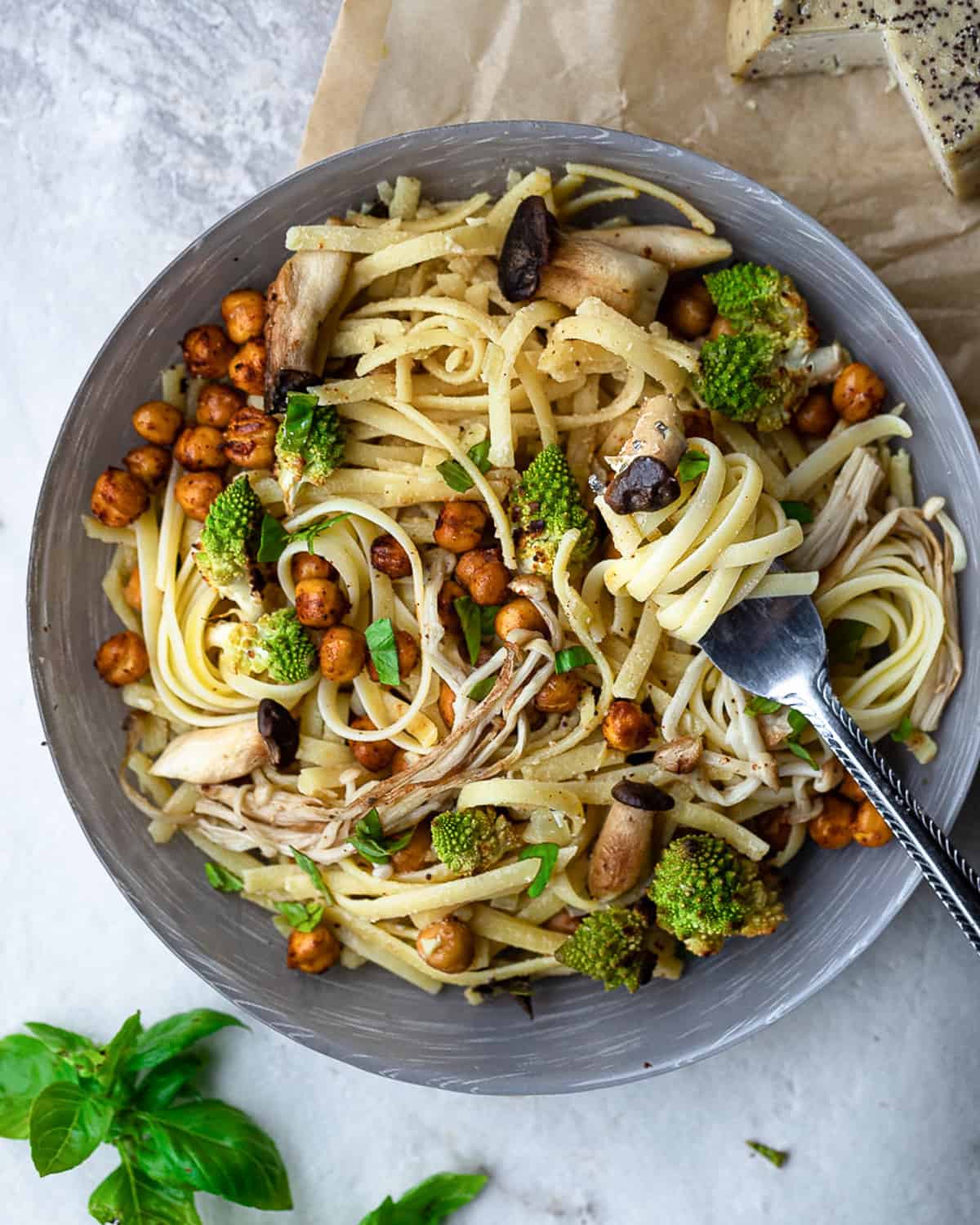


7-Day Vegan Pregnancy Meal Plan:
Here's a sample meal plan to give you an idea of how to structure your vegan or vegetarian pregnancy meals throughout the week:
Day 1:
- Breakfast: Overnight oats with berries and almond butter
- Snack: Apple slices with peanut butter
- Lunch: Quinoa salad with roasted vegetables and a lemon-tahini dressing
- Snack: Mixed nuts and seeds
- Dinner: High protein meatballs with pasta and sliced veggies
- Evening Snack: Homemade trail mix with dried fruits and coconut flakes
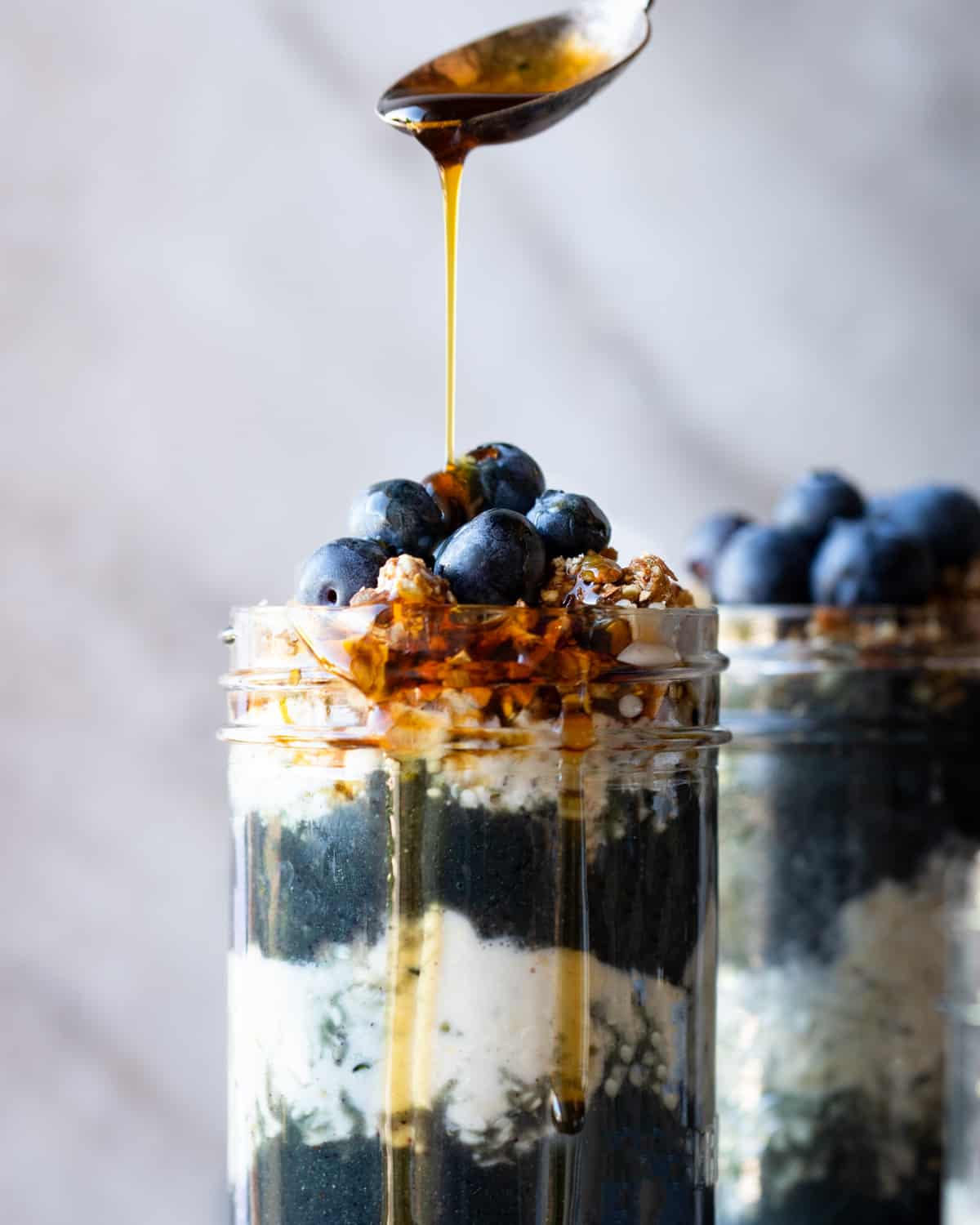

Day 2:
- Breakfast: Tofu scramble with sautéed spinach, bell peppers, and whole grain toast.
- Snack: A bowl of mixed berries (raspberries, blueberries, and strawberries).
- Lunch: Chickpea salad sandwich on whole grain bread with a side of carrot and cucumber sticks.
- Snack: Hummus with whole grain crackers.
- Dinner: Lentil curry with brown rice and a side of mixed greens.
- Evening Snack: Dark chocolate square and a glass of fortified almond milk.
Day 3:
- Breakfast: Buckwheat pancakes topped with fresh fruit and a drizzle of agave syrup.
- Snack: A banana with a spoonful of almond butter.
- Lunch: Baked sweet potato topped with black beans, salsa, and avocado.
- Snack: A handful of walnuts and raisins.
- Dinner: Tofu ricotta stuffed pasta shells
- Evening Snack: A bowl of coconut yogurt with a sprinkle of chia seeds.


Day 4:
- Breakfast: Smoothie made with spinach, banana, blueberries, chia seeds, and almond milk.
- Snack: A pair of kiwis and a handful of almonds.
- Lunch: Whole grain pasta salad with cherry tomatoes, cucumber, olives, and a tahini dressing.
- Snack: Carrot sticks with a side of beetroot hummus.
- Dinner: Veggie burger with sweet potato fries and roasted vegetables
- Evening Snack: Bowl of popcorn sprinkled with nutritional yeast.
Day 5:
- Breakfast: Chia pudding made with coconut milk and topped with a mix of your favorite fruits.
- Snack: Vegan Brazilian cheese bread
- Lunch: Vegetable lentil soup with a slice of whole grain bread.
- Snack: Apple slices with a small handful of walnuts.
- Dinner: Black bean and corn tacos with a side of guacamole and salsa.
- Evening Snack: Dried figs and a glass of fortified soy milk.


Day 6:
- Breakfast: Oatmeal cooked with almond milk, topped with sliced bananas, walnuts, and a sprinkle of cinnamon.
- Snack: A couple of mandarins and a handful of pumpkin seeds.
- Lunch: Chickpea "tuna" salad stuffed in a whole wheat pita with a side of mixed greens.
- Snack: A bowl of grapes and sunflower seeds.
- Dinner: Easy bean chili served with tortilla chips
- Evening Snack: Dark chocolate-covered almonds.
Day 7:
- Breakfast: Vegan waffles topped with a variety of berries and a drizzle of maple syrup.
- Snack: A banana with a sprinkle of sunflower seeds.
- Lunch: Creamy ceaser salad with roasted chickpeas
- Snack: Cucumber slices and bell pepper strips with a side of guacamole.
- Dinner: Orange sesame tofu with brown rice and steamed broccoli
- Evening Snack: A bowl of coconut yogurt topped with granola and dried fruits.
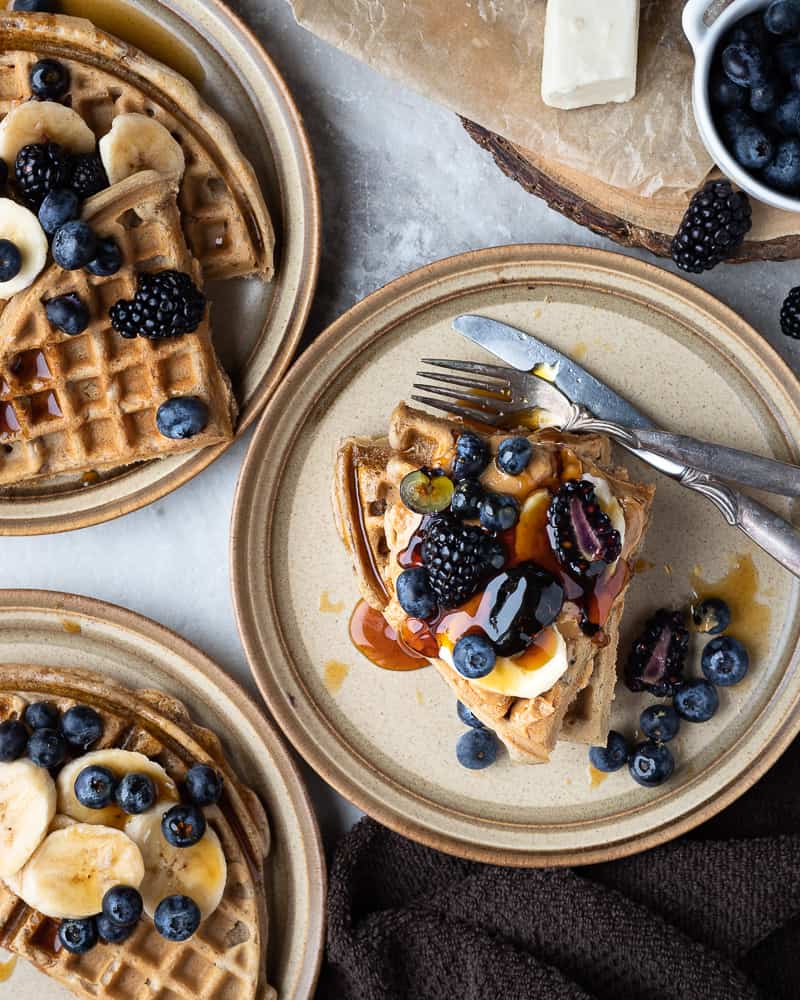

Remember to adjust portion sizes and incorporate snacks as needed based on your individual energy requirements. Feel free to customize this sample plan according to your taste preferences and dietary needs.
FAQ: Vegan Meal Plan for Pregnancy
Yes, you can get these nutrients from a well-planned vegetarian or vegan diet. Iron can be obtained from legumes, whole grains, and fortified cereals; calcium from fortified plant milk, tofu, and leafy greens; protein from legumes, whole grains, and soy products; and B12 mainly from fortified foods or supplements.
Iron-rich plant-based foods include lentils, chickpeas, and spinach. Calcium can be found in fortified plant milk, tofu, and leafy greens like kale. Legumes, soy products like tofu and tempeh, and whole grains like quinoa are excellent sources of protein. Vitamin B12 is commonly found in fortified foods like plant milks, breakfast cereals, and nutritional yeast. It's recommended to take B12 supplements if following a strict vegan diet.
Legumes such as lentils, chickpeas, black beans, and soy products like tofu and tempeh are high in protein. Whole grains like quinoa and seitan are also rich in protein. Nuts, seeds, and dairy products (if included in the diet) are also good sources.
My Plant-Based Journey: A Closing Note
In conclusion, the journey through my first vegan pregnancy was one of discovery, learning, and immense joy. It reinforced my conviction in the power of plant-based nutrition and showed me that fears surrounding vegan pregnancies, while valid, are not insurmountable. A vegetarian or vegan pregnancy can be not only safe but also incredibly beneficial, as long as it is well-planned and carefully monitored.
Scientific studies and medical consensus echo this sentiment: a well-structured vegetarian or vegan diet can support a healthy pregnancy and bring numerous health benefits. While some essential nutrients require extra attention, a varied and balanced plant-based diet, sometimes with the support of supplements, can meet the nutritional demands of pregnancy.
During my pregnancy, I relied heavily on nutrient-dense plant-based foods and worked closely with my healthcare provider to ensure my baby and I were getting everything we needed. Alongside regular bloodwork and dietary tweaks, I embraced the joy of nurturing my baby entirely on plant foods. Today, I can proudly say that my healthy, happy, chubby little man is living proof that a vegan pregnancy is not only possible but can also result in a thriving child.
I hope my story and the information shared in this guide will help other expecting mothers considering a vegetarian or vegan diet during pregnancy. Remember, every pregnancy is unique, and it's crucial to consult with a healthcare provider to create a plan that's right for you. I wish you all the very best on your plant-based pregnancy journey!
Remember to consult with a healthcare provider before making any significant changes to your diet during pregnancy. This guide is intended to provide general information and personal experiences and does not replace professional medical advice.
More Vegan Pregnancy Recipes:
I hope you enjoyed this post on the risks and benefits of a vegan pregnancy meal plan. I would love to hear about your pregnancy journey. Please comment below.
If you are looking for easy vegan and gluten-free weeknight recipes be sure to check out these:
Until then, tchau
Information Source
- Sebastiani, G., Herranz Barbero, A., Borrás-Novell, C., Alsina Casanova, M., Aldecoa-Bilbao, V., Andreu-Fernández, V., Pascual Tutusaus, M., Ferrero Martínez, S., Gómez Roig, M. D., & García-Algar, O. (2019). The Effects of Vegetarian and Vegan Diet during Pregnancy on the Health of Mothers and Offspring. Nutrients, 11(3), 557.
- Le, L. T., & Sabaté, J. (2014). Beyond meatless, the health effects of vegan diets: findings from the Adventist cohorts. Nutrients, 6(6), 2131-2147.
- Baroni, L., Goggi, S., Battaglino, R., Berveglieri, M., Fasan, I., Filippin, D., Griffith, P., Rizzo, G., Tomasini, C., Tosatti, M. A., & Battino, M. A. (2018). Vegan Nutrition for Mothers and Children: Practical Tools for Healthcare Providers. Nutrients, 11(1), 5.
- Koebnick, C., Hoffmann, I., Dagnelie, P. C., Heins, U. A., Wickramasinghe, S. N., Ratnayaka, I. D., Gruendel, S., Lindemans, J., & Leitzmann, C. (2004). Long-term ovo-lacto vegetarian diet impairs vitamin B-12 status in pregnant women. The Journal of Nutrition, 134(12), 3319-3326.
- Dwyer, J., & Loew, F. M. (1994). Nutritional Risks of Vegan Diets to Women and Children: Are They Preventable? Journal of Agricultural and Environmental Ethics, 7(1), 87-109.
- Office of Dietary Supplements. (2023). Nutrient Recommendations and Databases. Retrieved from https://ods.od.nih.gov/HealthInformation/nutrientrecommendations.aspx
- O'Leary, F., & Samman, S. (2010). Vitamin B12 in Health and Disease. Nutrients, 2(3), 299–316.
- Scholl, T. O., & Reilly, T. (2000). Anemia, Iron and Pregnancy Outcome. The Journal of Nutrition, 130(2), 443S–447S.
- Travers, C. A., Guttikonda, K., Norton, C. A., Lewis, P. R., Mollart, L. J., Wiley, V., Wilcken, B., Eastman, C. J., & Boyages, S. C. (2007). Iodine status in pregnant women and their newborns: are our babies at risk of iodine deficiency? The Medical Journal of Australia, 186(12), 674–677.
- Chong, E. W.-T., Kreis, A. J., Wong, T. Y., Simpson, J. A., & Guymer, R. H. (2008). Dietary ω-3 Fatty Acid and Fish Intake in the Primary Prevention of Age-Related Macular Degeneration: A Systematic Review and Meta-analysis. Archives of Ophthalmology, 126(6), 826.
- Prentice, A. (2004). Diet, Nutrition and the Prevention of Osteoporosis. Public Health Nutrition, 7(1a), 227–243.
- Maslova, E., Rytter, D., Bech, B. H., Henriksen, T. B., Rasmussen, M. A., Olsen, S. F., & Halldorsson, T. I. (2014). Maternal protein intake during pregnancy and offspring 20 y later. The American Journal of Clinical Nutrition, 100(4), 1139–1148.
- Sebastiani, G., Herranz Barbero, A., Borrás-Novell, C., Alsina Casanova, M., Aldecoa-Bilbao, V., Andreu-Fernández, V., Pascual Tutusaus, M., Ferrero Martínez, S., Gómez Roig, M. D., & García-Algar, O. (2019). The Effects of Vegetarian and Vegan Diet during Pregnancy on the Health of Mothers and Offspring. Nutrients, 11(3), 557.
- Tonstad, S., Nathan, E., Oda, K., & Fraser, G. (2013). Vegan Diets and Hypothyroidism. Nutrients, 5(11), 4642-4652.
- Duttaroy, A. K. (2021). Special Issue "Maternal DHA Impact on Child Neurodevelopment." Nutrients, 13(7), 2209.
- Winston J. Craig et al. (2021). The Safe and Effective Use of Plant-Based Diets with Guidelines for Health Professionals.Nutrients, 13(11), 4144.
- Steven H. Zeisel. (2006). Choline: Critical Role During Fetal Development and Dietary Requirements in Adults. Annual Review of Nutrition, 26, 229-250.

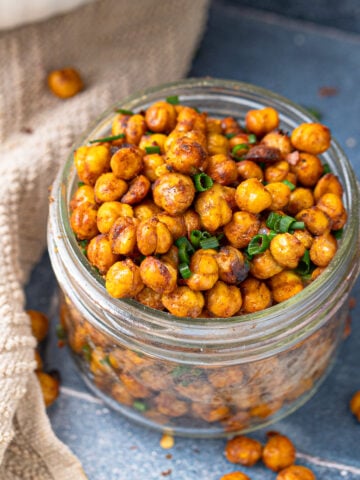
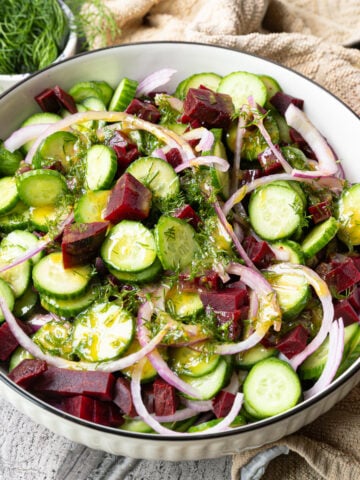



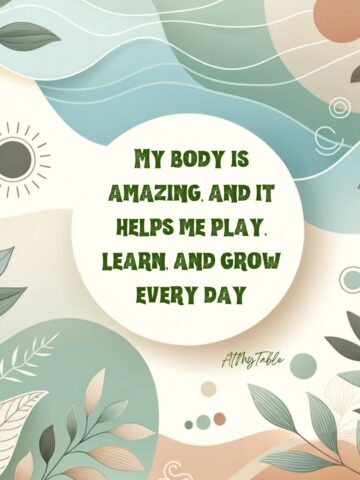

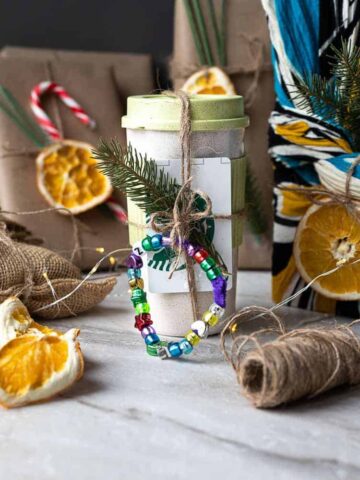
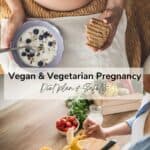
AnnAGullatte says
What's up, yes this paragraph is actually pleasant and I have learned lot of things from it on the topic of blogging. thanks.
xxx says
Hello, I enjoy reading all of your article post. I wanted to write a little comment to support you.
lucca86 says
Hello, congratulations to your healthy vegan baby! I am also pregnant now, 20th week of pregnancy and I was in the same way worried and unsure about my more than 10 years vegan path when I realized I was vegan. There is one thing to eat vegan in “singular” and the other thing to be responsible for the little baby and the whole process. What helped me to gain my confidence was searching for vegan mums online and in person in my country, I have discussed all my concerns and questions about healthy vegan pregancy. Most of the time I stick to the whole foods but time to time I indulge myself with some vegan junk food:), and I focus now much more on the variety of nutrients and caloric intake, especially because I still do crossfit workouts which is also quite demaning for diet requirements. Anyway, the first 3 months of pregnancy were also very difficult for me because of low energy and nausea, even though I did not have appetite I ate lots of fruit and started with vegan supplements. I had my blood tests done a few weeks ago for b12,iron and folate and I was very happy about results, I was even recommended to stop taking my vegan iron supplement as my levels of iron were even nigher than normal. I try to eat lots of veggies, legumes, lentils, black strap molasses, tofu, tempeh, dried fruit, seaweeds, plus I naturally lost mood for coffee and black tea in the first trimester so it is also helpful because cafeine blocks the iron absorption. However, thank you very much for your article, I am happy you are sharing your journey as it can help others to maintain healthy vegan diet in their pregnancies. Good luck!:)
atmytable says
That's fantastic! Wow amazing to gear you kept your iron up! I had issues with mine but I believe its because I wasn't eating enough legumes! Thanks again for the comment and for reading my blog post. Finding other vegan mama's really does help!
ambassadorsquest says
Thank you for sharing! I've been vegan for 7.5 years and love it! My husband and I are hoping to start a family next year and it is so reassuring to hear other vegans pregnancy stories and see their healthy babies! Did you use any pre natal vitamins at all? I just started rainbow light. I'd love to hear your birth story too!
atmytable says
Hey! Thanks for the comment. I actually didn't go on prenatals mostly because I was so sick. For some reason they just made me feel way worse which is why I was so diligent about checking my levels. My folate was already super high just because of how much plants I eat. But I was taking a B12 supplement and iron. The B12 was from Garden of Life and the iron floravit. Obviously if you can take and stomach a prenatal that's fast but still make sure to check your levels with your doctor because you don't want to rely just on the prenatals. I'll definitely right up my birth story and post it here soon so stay tuned.
tylerwhitefight says
Really enjoyed reading this!
In the course I'm currently doing for vegan nutrition it has a module around vegan pregnancy and so it's great to be able to see how it actually is for a mother in comparison to pregnancies on a regular diet.
I don't think it's a coincidence that Micah doesn't seem to be suffering from the amount of gas or bloating that your other 2 boys did! Well done on having the discipline to stick to a vegan diet by the way, especially as clean and whole food based as you did!!
Thanks for posting (and helping me to confirm what I learnt in my studies! haha) 😀
atmytable says
Wow that is so great to hear that you are learning this! I also agree, especially since i had 3 pregnancies with each having a different diet.
snyderfambam says
You may want to look into cooking with cast iron. It leeches little bits of iron into your meals, and actually is the reason I haven't had to take iron supplements my entire pregnancy. (:
It's totally safe, and definitely safer than using non-stick pots and pans which leeches toxic grossness into your food anyways.
Try that and see if that helps boost your iron levels
atmytable says
Thank you! I actually started cooking with it half way thru my pregnancy! I love using them and would never go back 🙂
Thanks for the comment ðŸ˜